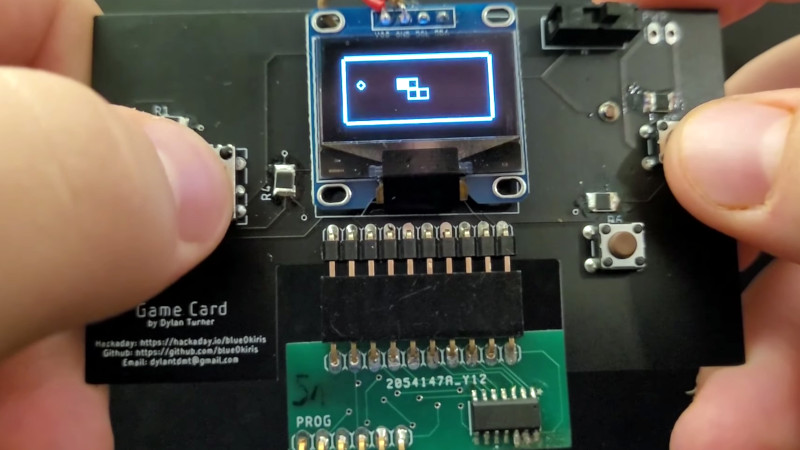Over the years we’ve seen plenty of homebrew handheld game systems that combine an AVR microcontroller, a few buttons, and an small OLED display. Some of them have even been turned into commercial products, such as the Arduboy. They’re simple, cheap, and with the right software, a lot of fun. But being based on an MCU, most of them share the same limitation of only being able to hold a single game at any one time.
But not the Game Card, by [Dylan Turner]. This handheld was specifically designed so that games could be easily swapped out using physical cartridges. But rather than trying to get the system’s microcontroller to boot code from an external flash chip, the system relocates the MCU to the removable cartridge. That might seem a bit overkill, but given how cheap the ATTINY84A on each cartridge is, it’s not exactly going to break the bank.
With the microcontroller on the cartridge, the only hardware that stays behind on the Game Card is the SSD1306 128×64 OLED display, buttons, and the battery. That means the handheld is effectively non-functional unless a game is slotted in, but that could be said of most early cartridge-based game systems as well. On the other hand, it also opens up the possibility of producing cartridges with more powerful microcontrollers down the line.
Using a different microcontroller for each game is a neat hack, but it’s not the only solution to the problem. We previously saw a community effort to add expandable storage to the Arduboy in the form of a DIY cartridge, which ultimately led to the development of an official flash chip upgrade for the handheld.
















https://hackaday.com/tag/business-card/
?
Cool, but I hate playing games on tiny screen can I output the video to a TV? (Nothing fancy though I don’t think this would benefit to much from HDMI.)
Useless trivia: the idea of MPU as removable game cartridge goes back about 40 years with Microvision system. The main unit had LCD, speaker, and control knob plus battery compartment. The cartridge had the CPU with ROM built inside (1k or 2k) and the color overlay for the LCD.
Inefficient design back then due to cost of chip but it worked for Milton Bradley.
Neat! I didn’t know about that
Here’s the wikipedia for anyone else interested: https://en.wikipedia.org/wiki/Microvision
I actually had a microvision back in the day.
I was also going to mention the Microvision. It was too expensive for me back in the day. But, I have a few now and even tinkered a bit with writing a (pre-alpha-never-going-to-be-finished) game for it using a PIC uController as the processor.
Other people are working on fully functional versions of new games for the Microvision now that multiple people have produced new LCD screens to address an extremely common failing of the device.
There’s at least one Facebook group for those curious about the current goings-on around the Microvision.
IR / RF / wired link cable perhaps.
Great video! And really cool concept. Keep it up!
the video opens with: “this is a business card… what could you do with a business card?” Well… this is the obvious answer… you can put a real business card in your wallet, give it to others so they can put in in their wallet or pocket. It fold’s automatically if it doesn’t fit whatever you are putting it in, it can hold crucial information in case people might be wanting to contact you.
Now if you make the base material 15 times thicker, add some sharp point components on top, decorate it with a flimsy glass display module and keep all the sharp corners on the PCB, then do not expect people to contact you, well perhaps for a lawsuit because they hurt themselves (while putting it in or taking it out of the pocket).
This project has nothing to do with a business card or the concept of making business card PCB’s. The concept of most of the wonderful business card PCB projects is to showcase your skills. To demonstrate that you can make something nice, small tiny and tidy, and have an eye for detail but most importantly… flat (which may require some out of the box solutions in order to achieve). This is, sort of, the opposite of such a card.
Have a nice day you to.